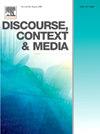“View profiles without pronouns”: The politics and discourse of ‘anti-woke’ right-wing dating app, The Right Stuff
IF 3.1
2区 文学
Q1 COMMUNICATION
引用次数: 0
Abstract
This paper critically analyses the so-called “anti-woke” conservative dating app, The Right Stuff. Launched in September 2022, The Right Stuff was co-founded by former Trump aide and Project 2025 staffer, John McEntee, and financially supported by rightwing billionaire investor Peter Thiel. The app was created for conservatives to connect in “authentic and meaningful ways”, given that other dating apps have allegedly “gone woke”. The invitation only dating app is designed exclusively for heterosexual users, and boasts of only offering binary she/he pronouns. Indeed, The Right Stuff’s advertising campaign mocks the inclusive and diverse affordances of other dating apps, including Tinder and Bumble. However, the app has struggled to gain traction with conservative users with media reports noting a substantial drop-off in downloads since September 2022, despite being promoted by prominent right-wing influencers such as Kyle Rittenhouse. Moreover, the app has been criticised by users for a lack of women using the platform. Drawing on a Critical Discourse Analysis (CDA) of The Right Stuff’s website, TikTok promotional materials, and YouTube channel, this paper explores how exclusion is built into the app’s promotion and claims about its digital architecture, and the associated implications for online dating in the future. This paper argues that The Right Stuff is a manifestation of the broader political polarisation of politics in the United States, and the intersection of politics and intimacy. Moreover, despite The Right Stuff’s apparent failure, it is clear that politically based dating apps will proliferate in the future. This paper aims to contribute to our growing understanding of the role of politics in digitally mediated dating.
“不使用代词查看个人资料”:“反觉醒”右翼约会应用The Right Stuff的政治和话语
本文批判性地分析了所谓的“反觉醒”保守约会应用程序“正确的东西”。The Right Stuff成立于2022年9月,由特朗普的前助手、2025计划的工作人员约翰·麦肯蒂共同创立,并得到了右翼亿万富翁投资者彼得·蒂尔的资助。这款应用是为保守派人士打造的,目的是让他们以“真实而有意义的方式”联系,因为其他约会应用据称已经“醒了”。这款只接受邀请的约会应用专为异性恋用户设计,并声称只提供二元代词“她/他”。事实上,The Right Stuff的广告宣传活动对Tinder和Bumble等其他约会应用的包容性和多样性进行了嘲笑。然而,这款应用一直难以吸引保守派用户,媒体报道称,自2022年9月以来,该应用的下载量大幅下降,尽管它得到了凯尔·里滕豪斯(Kyle Rittenhouse)等著名右翼影响者的推广。此外,该应用还因缺少女性用户而受到用户的批评。通过对The Right Stuff网站、TikTok宣传材料和YouTube频道的批判性话语分析(CDA),本文探讨了如何将排斥融入到应用程序的推广和对其数字架构的主张中,以及对未来在线约会的相关影响。本文认为,《正确的东西》是美国政治更广泛的政治两极分化的表现,是政治与亲密关系的交集。此外,尽管The Right Stuff显然失败了,但很明显,基于政治的约会应用将在未来激增。本文旨在帮助我们加深对政治在数字媒介约会中的作用的理解。
本文章由计算机程序翻译,如有差异,请以英文原文为准。
求助全文
约1分钟内获得全文
求助全文

 求助内容:
求助内容: 应助结果提醒方式:
应助结果提醒方式:


